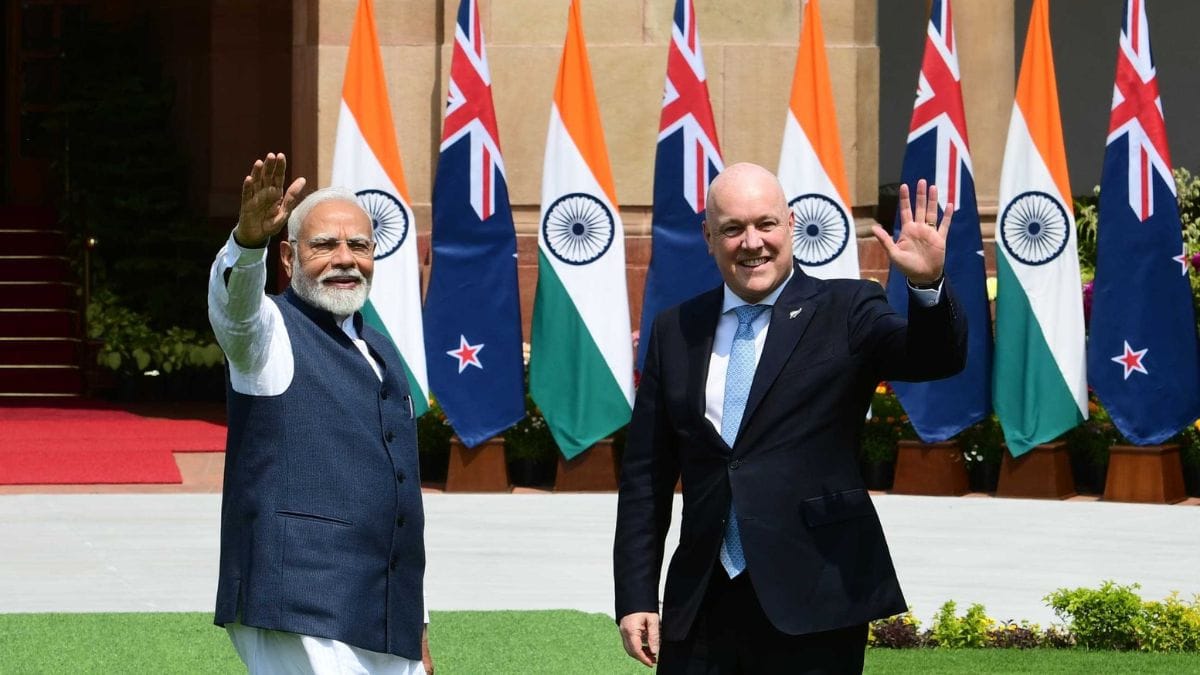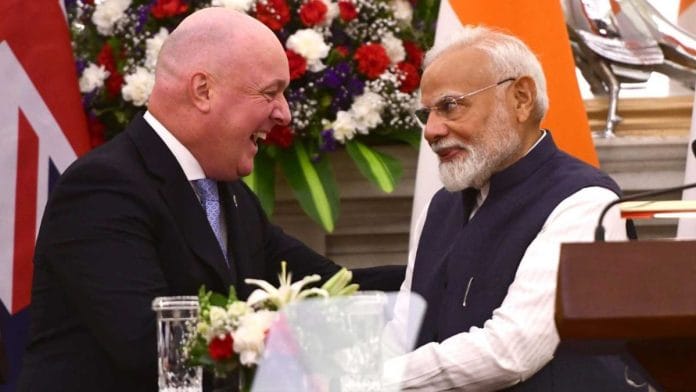New Delhi: On Monday, Prime Minister Narendra Modi called for action against Sikh separatists active in New Zealand, as the two countries agreed to institutionalize their defence partnership during Prime Minister Christopher Luxon’s 5-day visit to India.
“We shared our concern about anti-India activities by some illegal elements in New Zealand. We are confident that we will continue to get the cooperation of the New Zealand government against all these illegal elements,” said Modi in a statement to the press, without directly using the term “Sikh separatists”.
Modi added: “We both are unanimous against terrorism. Whether it is the Christchurch terrorist attack of 15 March 2019 or the Mumbai attack of 26 November 2008, terrorism in any form is unacceptable. Strict action is necessary against those guilty of terrorist attacks. We will continue to cooperate together against terrorist, separatist and radical elements.
In the last few years, a number of Indians have sought asylum in New Zealand, seeking protection from religious persecution. Between 2022-2023 and 2023-2024, the number of asylum seekers grew by 579 percent, as reported by ThePrint.
As the Indian immigrant population in New Zealand has grown, so too has Sikh separatism, with Sikhs for Justice—a banned organisation in India—increasing its activities, including holding “referendums” on the secession of the state of Punjab.
Luxon is on a 5-day visit to India, arriving in the country Sunday. He is set to travel to Mumbai from New Delhi. The Prime Minister of New Zealand is also the chief guest for this year’s Raisina Dialogue organised by the Ministry of External Affairs and the Observer Research Foundation.

The two countries signed six agreements, including a memorandum of understanding on defence cooperation. The Indian PM announced that a “roadmap” for “mutual cooperation” in the defence industry will be agreed to by both countries, apart from “institutionalising” the partnership.
“Both Leaders welcomed the signing of the India-New Zealand Memorandum of Understanding for Defence Cooperation. This will further strengthen bilateral defence cooperation and establish regular bilateral defence engagement. Both sides noted the need for ensuring the safety and security of sea lanes of communication and agreed there needs to be regular dialogue to discuss enhancement of maritime safety,” said the Joint Statement agreed to by both the leaders.
The other agreements cover the sectors of education, sports, forestry, horticulture and an authorised economic operator mutual recognition agreement (AEO-MRA) as the two countries look to cement their ties.
Another major outcome of Luxon’s visit is the launch of the negotiations for a free trade agreement (FTA) between New Delhi and Wellington. The announcement was made Sunday during a meeting between Piyush Goyal, the Indian Minister of Commerce and Industry and Todd McClay, the New Zealand Minister for Trade and Investment.
Both New Delhi and Wellington also agreed to launch negotiations for a mobility agreement for skilled labour. New Zealand also announced that it will be joining the Indo-Pacific Oceans’ Initiative (IPOI) and the Coalition for Disaster Resilient Infrastructure (CDRI). The latter organisation was launched by Modi at the 2019 United Nations Climate Action Summit held in New York City.
Critical minerals, security and international affairs
A large part of the India-New Zealand Joint Statement focused on cooperation between the two countries in the international realm, including Wellington’s support for New Delhi’s joining the Nuclear Suppliers Group (NSG), and on common positions on international situations including the war in Ukraine and the conflict in Gaza, reform of multilateral institutions and the situation in the Indo-Pacific.
“Both Leaders emphasised the importance of upholding the global nuclear disarmament and non-proliferation regime, and acknowledged the value of India joining the Nuclear Suppliers Group in context of predictability for India’s clean energy goals and its non-proliferation credentials,” said the joint statement.
India applied for membership at the NSG in 2016, however, it has yet to be accepted by the organisation, due to the lack of consensus among its member-states currently. One of the main sticking points for Indian membership is that it has not signed the Nuclear Non-Proliferation Treaty (NPT).
The NSG was formed after India conducted its first nuclear weapons test in 1974. The 48-member organisation—which consists of the US, the UK, France, Russia, China and 43 other signatories of the NPT—has access to some of the most advanced nuclear technologies. By being outside of the NSG, India can be denied sophisticated technology as it looks to transition towards renewable energy sources.
“Mutual cooperation and investment will be encouraged in areas like dairy, food processing, and pharma. We have given priority to mutual cooperation in the areas of renewable energy and critical minerals,” said Modi, indicating the interest between the two leaders in partnering in these sectors.
Wellington also endorsed New Delhi’s bid for a permanent seat on the United Nations Security Council (UNSC), “stressing the need” for UN reforms to better reflect contemporary reality.
Both the leaders also called for a just and lasting peace in Ukraine “based on respect for international law, principles of the UN charter, and territorial integrity and sovereignty”, and endorsed a two-state solution in West Asia, with a sovereign state of Palestine existing alongside Israel.
(Edited by Zinnia Ray Chaudhuri)
Also read: Modi underlines ‘no-dispute’ approach to ties with China, endorses healthy competition






